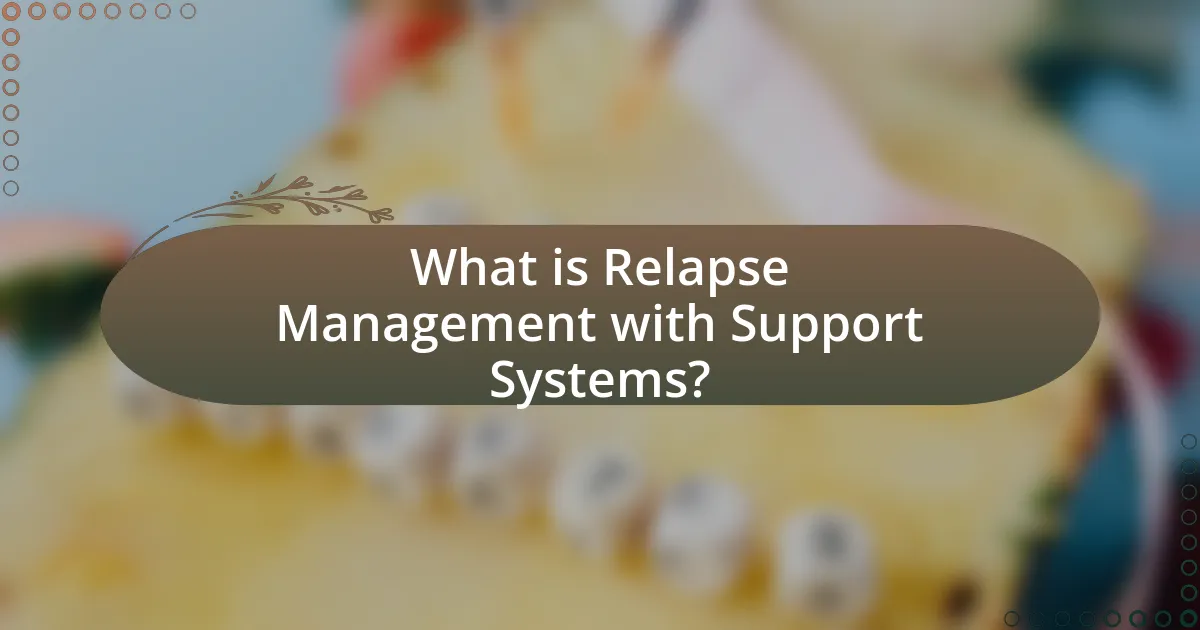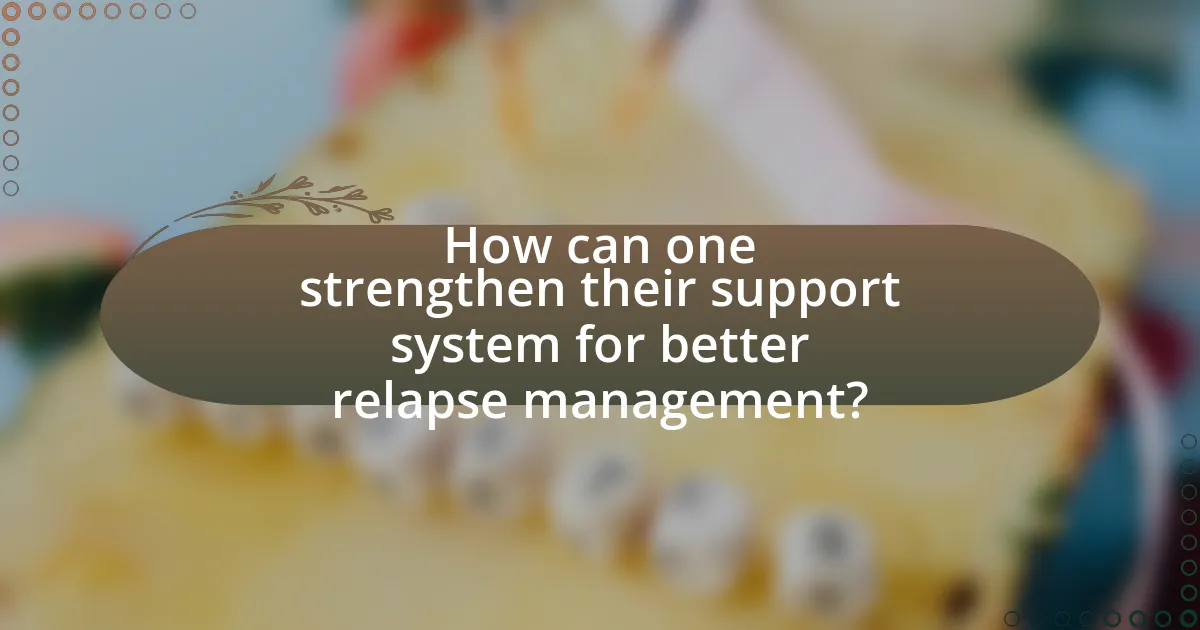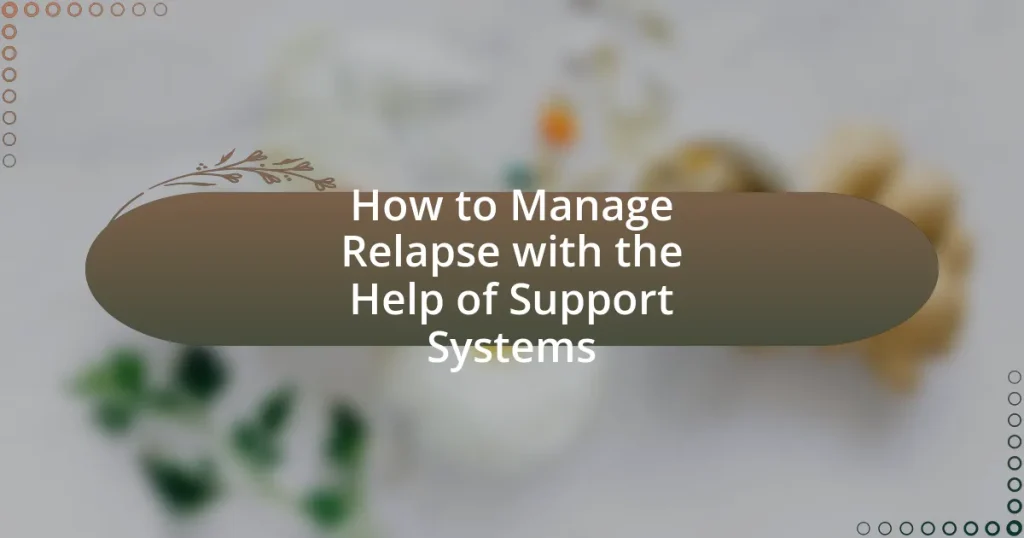Relapse management with support systems is a structured approach aimed at preventing and addressing relapse in individuals recovering from addiction or mental health issues. The article outlines the significance of support systems, including family, friends, therapists, and peer groups, in enhancing recovery outcomes by providing emotional and practical assistance. It discusses common triggers for relapse, the influence of emotional states, and effective strategies for managing relapse, such as establishing strong support networks and utilizing coping mechanisms. Additionally, the article highlights the role of technology and communication in strengthening support systems, emphasizing the importance of regular check-ins and diverse connections in promoting sustained recovery.

What is Relapse Management with Support Systems?
Relapse management with support systems involves structured strategies and resources aimed at preventing and addressing relapse in individuals recovering from addiction or mental health issues. This approach typically includes the involvement of family, friends, therapists, and support groups, which provide emotional, social, and practical assistance. Research indicates that individuals who engage with support systems during recovery have a higher success rate in maintaining sobriety, as these networks offer accountability, encouragement, and shared experiences that can mitigate the risk of relapse.
How does relapse occur in recovery processes?
Relapse in recovery processes occurs when an individual returns to substance use or harmful behaviors after a period of abstinence. This phenomenon is often triggered by various factors, including stress, environmental cues, and emotional distress, which can overwhelm coping mechanisms developed during recovery. Research indicates that approximately 40% to 60% of individuals in recovery experience relapse, highlighting its prevalence and the need for effective support systems to mitigate these risks. Factors such as lack of social support, insufficient coping strategies, and underlying mental health issues can significantly increase the likelihood of relapse, emphasizing the importance of comprehensive recovery plans that include ongoing support and intervention.
What are the common triggers for relapse?
Common triggers for relapse include stress, environmental cues, emotional distress, and social pressures. Stress can lead individuals to revert to old behaviors as a coping mechanism, while environmental cues, such as being in places associated with past substance use, can trigger cravings. Emotional distress, including feelings of sadness or anxiety, often prompts individuals to seek relief through substances. Additionally, social pressures from peers or family can influence decisions to relapse. Research indicates that these triggers are significant factors in relapse rates, highlighting the importance of recognizing and managing them effectively.
How does emotional state influence the likelihood of relapse?
Emotional state significantly influences the likelihood of relapse, as negative emotions such as stress, anxiety, and depression can trigger cravings and lead to substance use. Research indicates that individuals experiencing heightened emotional distress are more susceptible to relapse due to impaired decision-making and increased impulsivity. A study published in the Journal of Substance Abuse Treatment found that 70% of participants who reported high levels of emotional distress relapsed within six months, compared to only 30% of those with stable emotional states. This correlation underscores the importance of emotional regulation and support systems in preventing relapse.
Why are support systems important in managing relapse?
Support systems are crucial in managing relapse because they provide emotional, psychological, and practical support that can significantly reduce the likelihood of returning to harmful behaviors. Research indicates that individuals with strong support networks are more likely to maintain recovery, as these systems offer accountability, encouragement, and a sense of belonging. For instance, a study published in the Journal of Substance Abuse Treatment found that social support is a key predictor of recovery outcomes, highlighting that individuals with supportive relationships experience lower rates of relapse compared to those without such networks.
What types of support systems are available for individuals in recovery?
Various support systems are available for individuals in recovery, including peer support groups, professional counseling, and family support. Peer support groups, such as Alcoholics Anonymous and Narcotics Anonymous, provide a community of individuals who share similar experiences, fostering accountability and encouragement. Professional counseling offers personalized strategies and coping mechanisms through trained therapists, enhancing emotional and psychological well-being. Family support involves the active participation of loved ones, which has been shown to improve recovery outcomes by providing a stable and understanding environment. Research indicates that individuals who engage with these support systems have higher success rates in maintaining sobriety and managing relapse.
How do peer support groups contribute to relapse prevention?
Peer support groups contribute to relapse prevention by providing a network of shared experiences and emotional support that fosters accountability and resilience among members. These groups create an environment where individuals can openly discuss their challenges and successes, which helps to normalize the recovery process and reduce feelings of isolation. Research indicates that participation in peer support groups can lead to improved coping strategies and a greater sense of belonging, both of which are critical factors in maintaining sobriety. For instance, a study published in the Journal of Substance Abuse Treatment found that individuals involved in peer support programs reported lower rates of relapse compared to those who did not participate, highlighting the effectiveness of these groups in sustaining recovery.

What strategies can be employed to manage relapse effectively?
To manage relapse effectively, individuals can employ strategies such as establishing a strong support system, utilizing coping mechanisms, and engaging in regular self-assessment. A strong support system, including friends, family, or support groups, provides emotional and practical assistance, which has been shown to reduce the likelihood of relapse. For instance, research indicates that individuals with supportive social networks are 50% more likely to maintain recovery compared to those without such support. Coping mechanisms, such as mindfulness and stress management techniques, help individuals navigate triggers and cravings, thereby decreasing the risk of relapse. Regular self-assessment allows individuals to identify early warning signs of relapse, enabling timely intervention. These strategies collectively enhance resilience and promote sustained recovery.
How can individuals identify their personal triggers?
Individuals can identify their personal triggers by maintaining a detailed journal of their thoughts, feelings, and behaviors in various situations. This practice allows individuals to recognize patterns and specific circumstances that lead to emotional responses or cravings. Research indicates that self-monitoring can enhance self-awareness, which is crucial for identifying triggers. For example, a study published in the Journal of Substance Abuse Treatment found that individuals who tracked their emotional states and situations were better able to pinpoint their triggers, leading to more effective coping strategies.
What self-assessment tools can help in recognizing triggers?
Self-assessment tools that can help in recognizing triggers include journaling, mood tracking apps, and cognitive-behavioral therapy (CBT) worksheets. Journaling allows individuals to document their thoughts and feelings, helping to identify patterns and specific situations that lead to triggers. Mood tracking apps, such as Daylio or Moodfit, enable users to log their emotions and activities, facilitating the recognition of correlations between certain behaviors and emotional states. CBT worksheets provide structured methods for analyzing thoughts and behaviors, assisting individuals in pinpointing triggers and developing coping strategies. These tools are effective because they encourage self-reflection and provide tangible data that can reveal underlying patterns related to triggers.
How can mindfulness practices aid in trigger identification?
Mindfulness practices aid in trigger identification by enhancing self-awareness and promoting present-moment focus. This heightened awareness allows individuals to recognize emotional and physical responses to specific situations or stimuli that may lead to relapse. Research indicates that mindfulness can significantly reduce reactivity to triggers, as evidenced by a study published in the journal “Substance Use & Misuse,” which found that participants who engaged in mindfulness training reported a greater ability to identify and manage their triggers compared to those who did not. By fostering a non-judgmental observation of thoughts and feelings, mindfulness equips individuals with the tools to discern their triggers more effectively, ultimately supporting relapse prevention strategies.
What role does communication play in utilizing support systems?
Communication is essential in utilizing support systems as it facilitates the exchange of information, emotions, and resources among individuals seeking assistance. Effective communication enables individuals to articulate their needs, share experiences, and receive feedback, which enhances the overall effectiveness of the support system. Research indicates that open communication within support groups leads to increased trust and stronger relationships, ultimately improving outcomes for individuals managing relapse. For instance, a study published in the Journal of Substance Abuse Treatment found that participants who engaged in regular communication with their support networks reported lower relapse rates compared to those who did not. This underscores the critical role that communication plays in leveraging support systems for recovery.
How can individuals effectively communicate their needs to their support network?
Individuals can effectively communicate their needs to their support network by being clear, direct, and specific about what they require. This involves articulating feelings and needs without ambiguity, which helps the support network understand how to assist. Research indicates that clear communication reduces misunderstandings and fosters stronger relationships, as evidenced by a study published in the Journal of Communication, which found that effective communication is linked to better emotional support outcomes. Additionally, using “I” statements can help express personal needs without placing blame, further enhancing the clarity of the message.
What are the best practices for maintaining open dialogue with support members?
The best practices for maintaining open dialogue with support members include regular check-ins, active listening, and creating a safe environment for sharing. Regular check-ins foster consistent communication, allowing support members to express concerns and updates. Active listening ensures that members feel heard and valued, which strengthens relationships. Creating a safe environment encourages honesty and vulnerability, essential for effective support. Research indicates that open communication in support systems significantly enhances emotional well-being and reduces relapse rates, as highlighted in studies by the Substance Abuse and Mental Health Services Administration.

How can one strengthen their support system for better relapse management?
To strengthen a support system for better relapse management, individuals should actively engage with trusted friends, family members, and support groups. Building open communication with these individuals fosters a sense of accountability and understanding, which is crucial for managing potential relapses. Research indicates that social support significantly reduces the risk of relapse; for instance, a study published in the Journal of Substance Abuse Treatment found that individuals with strong social networks are 50% less likely to relapse compared to those without such support. Additionally, participating in regular group meetings, such as those offered by Alcoholics Anonymous or similar organizations, can provide ongoing encouragement and shared experiences that reinforce commitment to recovery.
What qualities should one look for in a support system?
A support system should possess qualities such as reliability, empathy, and effective communication. Reliability ensures that individuals can depend on their support network during challenging times, which is crucial for managing relapse. Empathy allows members of the support system to understand and share feelings, fostering a safe environment for open discussions about struggles. Effective communication facilitates clear expression of needs and concerns, which is essential for addressing issues promptly. Research indicates that strong social support can significantly reduce the risk of relapse, highlighting the importance of these qualities in a support system.
How can individuals build a diverse support network?
Individuals can build a diverse support network by actively seeking connections across various backgrounds, experiences, and perspectives. Engaging in community activities, joining interest-based groups, and utilizing social media platforms can facilitate these connections. Research indicates that diverse networks enhance problem-solving and creativity, as highlighted in a study by the Harvard Business Review, which found that teams with diverse members outperform homogeneous teams in innovation. By intentionally reaching out to individuals from different cultures, professions, and life experiences, individuals can create a robust support system that offers varied insights and resources, ultimately aiding in managing challenges such as relapse.
What are the benefits of having a mentor in recovery?
Having a mentor in recovery provides essential guidance, accountability, and emotional support, which significantly enhances the recovery process. Mentors, often individuals who have successfully navigated their own recovery journeys, offer valuable insights and strategies that can help mentees avoid common pitfalls. Research indicates that mentorship in recovery can lead to higher success rates; for instance, a study published in the Journal of Substance Abuse Treatment found that individuals with mentors were 50% more likely to maintain sobriety over a year compared to those without. This relationship fosters a sense of community and belonging, which is crucial for emotional well-being during recovery.
How can technology enhance support systems in relapse management?
Technology can enhance support systems in relapse management by providing real-time monitoring, personalized interventions, and access to resources. For instance, mobile applications can track user behavior and mood, allowing for timely alerts to both the individual and their support network when signs of potential relapse are detected. Research indicates that digital platforms, such as telehealth services, improve access to counseling and support groups, which can lead to better outcomes in recovery. A study published in the Journal of Substance Abuse Treatment found that individuals using technology-based interventions had a 30% higher retention rate in treatment programs compared to those relying solely on traditional methods. This demonstrates that technology not only facilitates immediate support but also fosters ongoing engagement in recovery efforts.
What apps and online resources are available for support in recovery?
Apps and online resources available for support in recovery include platforms like Alcoholics Anonymous (AA) online meetings, SMART Recovery, and the Sober Grid app. Alcoholics Anonymous offers virtual meetings and resources that connect individuals with a global support network, facilitating peer support and shared experiences. SMART Recovery provides online meetings and tools focused on self-management and recovery training, emphasizing evidence-based techniques. The Sober Grid app serves as a social network for individuals in recovery, allowing users to connect, share experiences, and find local support. These resources are widely recognized for their effectiveness in aiding recovery and managing relapse.
How can virtual support groups be as effective as in-person meetings?
Virtual support groups can be as effective as in-person meetings by providing accessibility, fostering connection, and utilizing technology for engagement. Research indicates that participants in virtual support groups often report similar levels of emotional support and satisfaction as those attending in-person meetings. A study published in the Journal of Medical Internet Research found that online support groups can reduce feelings of isolation and enhance coping strategies, which are crucial for managing relapse. Additionally, the convenience of virtual meetings allows individuals to participate from various locations, increasing attendance and engagement.
What practical tips can help in managing relapse with support systems?
Practical tips for managing relapse with support systems include establishing open communication with support network members, setting clear goals, and utilizing coping strategies. Open communication fosters trust and allows individuals to express their feelings and challenges, which can lead to timely interventions. Setting clear goals provides direction and motivation, making it easier to stay focused on recovery. Utilizing coping strategies, such as mindfulness or stress management techniques, can help individuals navigate triggers and cravings effectively. Research indicates that individuals with strong support systems are more likely to maintain long-term recovery, highlighting the importance of these practical tips in relapse management.
How can regular check-ins with support members prevent relapse?
Regular check-ins with support members can prevent relapse by providing accountability and emotional support. These interactions create a structured environment where individuals can openly discuss their challenges and progress, which helps to identify potential triggers for relapse early. Research indicates that social support significantly reduces the likelihood of relapse; for instance, a study published in the Journal of Substance Abuse Treatment found that individuals with regular support interactions had a 50% lower relapse rate compared to those without such support. This consistent engagement fosters a sense of belonging and encourages individuals to stay committed to their recovery goals.
What are some daily practices to reinforce commitment to recovery?
Daily practices to reinforce commitment to recovery include setting specific goals, maintaining a structured routine, and engaging in mindfulness exercises. Setting specific goals helps individuals focus on achievable milestones, which can enhance motivation and provide a sense of accomplishment. Maintaining a structured routine fosters stability and predictability, reducing the likelihood of relapse by minimizing idle time. Engaging in mindfulness exercises, such as meditation or deep-breathing techniques, can improve emotional regulation and reduce stress, which are critical factors in sustaining recovery. Research indicates that these practices contribute to long-term recovery success by promoting resilience and self-awareness.
